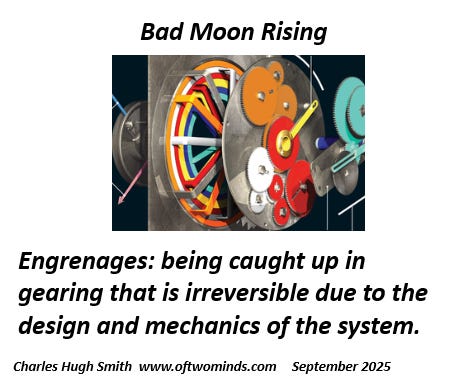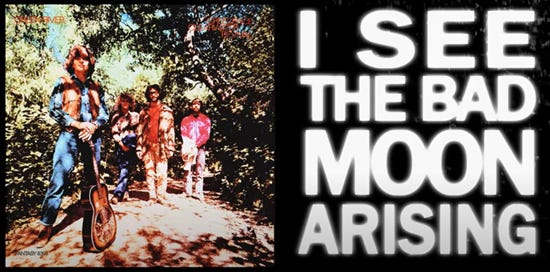Precarity and the Point of No Return

I often wonder if others feel the precarity of this era, or is it just me? It’s hard to tell, as economic statistics don’t measure precarity, they mostly measure averages and aggregates, all of which are glowing: GDP and profits up, unemployment low, and so on.
If precarity makes the news, it’s the financial precarity experienced by many American households as costs rise and wages don’t keep up, regardless of what the aggregate statistics are indicating.
This precarity is real, but it’s not what’s being featured. It’s reflected in mirrors, not in headlines. In this mirror, we see millions of people pursuing side hustles and crowding into speculative casinos. If this isn’t a reflection of desperation, it’s something close to it. But this isn’t news.
The precarity extends into the realms of public trust. Expertise backed by credentials–presented as evidence the public could trust the credentialed experts to serve the public interest with disinterested competence–have been eroded by self-interest. Public trust is as precarious as household budgets.
Faith in our future prospects is equally precarious. We’re presented with an endless series of science-fiction fantasies brought to life–flying motorcycles, driverless taxis, household robots, energy so cheap we won’t even bother metering it–but the mirror is reflecting a much different future, one of precarity, uncertainty and decay of what can’t be measured like GDP or profits.
We all sense when we’ve reached a Point of No Return, a river like the Rubicon that should we cross it, there’s no going back. There’s another type of Point of No Return: the point in the journey where we realize we no longer have the resources to retrace our steps and return to the safety of what we left behind.
At this point, we can only go forward into an uncertain future, one without guarantees and one in which trust is diminishing as steadily as the water in our canteen. This is when the temptation to grasp at straws and seek scapegoats looms large, and the potential of losing our grip is a greater threat that the unknowns ahead.
There’s a bad moon rising, and this makes our journey forward more precarious. We like to believe we’re in control of our destiny, but the world around us has its own destiny, and we’re making choices on a stage with its own gearing.

The gearing of precarity is guiding the machine, whether we’re aware of it or not. I fear for the nation, as the journey ahead is faintly illuminated by a bad moon rising. I fear the dwindling sandbar between the raging currents of partisanship will disappear beneath my feet.

Or maybe it’s just me, and all is well. Time will tell.
https://charleshughsmith.substack.com/p/precarity-and-the-point-of-no-return
